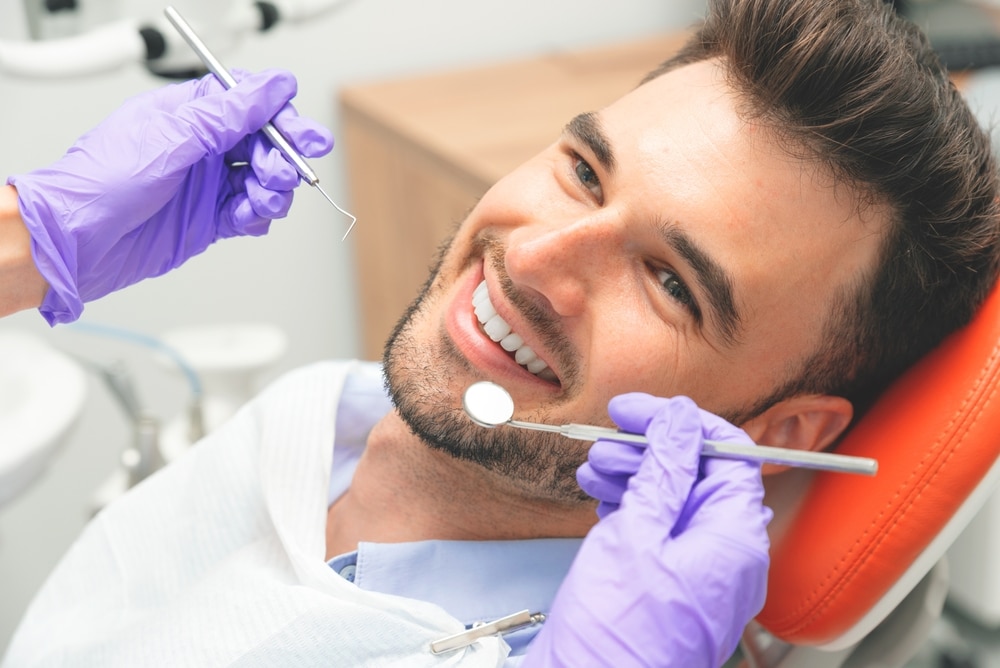Routine dental visits are essential for maintaining a healthy, confident smile. At his Albuquerque dental office, Dr. Steven Holbrook offers comprehensive dental exams, professional cleanings, and digital x-rays to help prevent problems before they become more serious. These visits are not just about clean teeth, they’re also an opportunity to detect decay, monitor gum health, screen for oral cancer, and assess the overall condition of the mouth.
With decades of experience, Dr. Holbrook provides thorough, personalized care at every appointment, ensuring patients feel informed and comfortable throughout their visit.

What Happens During a Dental Exam?
Dr. Holbrook performs a comprehensive dental exam during your initial visit and each regular check-up. These exams are crucial for identifying issues early and supporting long-term oral health. A typical dental exam includes:
- Examination of Diagnostic X-Rays (Radiographs):
X-rays allow Dr. Holbrook to detect cavities, cysts, tumors, impacted teeth, and bone loss. They also show tooth and root positions and are essential for creating accurate treatment plans. - Oral Cancer Screening:
The soft tissues of the mouth (such as the lips, tongue, throat, and cheeks) are carefully examined for any signs of abnormal changes. This painless screening helps detect oral cancer in its earliest, most treatable stages. - Gum Disease Evaluation:
Gums are examined for signs of gingivitis or more advanced periodontal disease. Dr. Holbrook evaluates the health of the supporting bone structure and looks for any bleeding, inflammation, or pocketing around the teeth. - Examination of Tooth Decay:
Each tooth surface is checked with special dental instruments to find areas of decay or soft spots that may not yet show up on x-rays. Early detection allows for more conservative and less invasive treatment. - Examination of Existing Restorations:
Fillings, crowns, bridges, and other dental restorations are reviewed to ensure they are still secure and functioning properly.
What to Expect During a Dental Cleaning
Dental cleanings, or prophylaxis, are typically performed by a Registered Dental Hygienist. These professional cleanings are designed to remove the bacteria and debris that can lead to cavities, bad breath, and gum disease.
Your dental cleaning includes:
- Removal of Calculus (Tartar):
Tartar is plaque that has hardened over time and cannot be removed with brushing alone. It tends to form around the gum line and between teeth. Using special tools, your hygienist removes it to reduce the risk of gum irritation and infection. - Removal of Plaque:
Plaque is a sticky film made up of bacteria, food particles, and saliva. When left untreated, plaque produces toxins that inflame the gums and can lead to gum disease. - Teeth Polishing:
After scaling and brushing, the hygienist polishes the teeth to remove surface stains and leave the enamel smooth. Polishing also helps reduce plaque buildup between visits.
Routine dental cleanings not only improve oral hygiene but also contribute to fresher breath and a brighter smile.
Why Are Dental X-Rays Necessary?
Dental radiographs (x-rays) are preventive diagnostic tools that give a complete view of the teeth, roots, and jawbone. Many dental problems begin beneath the surface and can go undetected without the help of imaging.
X-rays can detect:
- Decay between the teeth
- Bone loss due to periodontal disease
- Dental abscesses or cysts
- Tumors (cancerous and non-cancerous)
- Developmental abnormalities in younger patients
- Poor tooth and root positioning
- Damage beneath existing restorations
By catching problems early, Dr. Holbrook can recommend appropriate treatments that help patients avoid more extensive and costly procedures in the future.
Are Dental X-Rays Safe?
Yes, dental x-rays are considered very safe. We are all exposed to low levels of natural radiation every day. The radiation exposure from a full mouth series of digital dental x-rays is comparable to what one might receive during a day of normal environmental exposure.
To ensure patient safety, Dr. Holbrook uses modern digital x-rays that emit significantly less radiation than traditional film methods. Additionally, lead aprons and protective collars are used to shield the body from unnecessary exposure.

Read what our patients are saying!
"Much thanks for all your excellent dental work, as well as your comforting chair side manner. Thanks also to your excellent staff."
Click here to read more reviews.
How Often Do You Need Dental X-Rays?
The frequency of x-rays depends on your age, dental history, and oral health condition.
- Full Mouth Series: Usually recommended for new patients and repeated every 3 to 5 years, depending on individual risk factors.
- Bite-Wing X-Rays: Taken during routine check-ups to check for decay between the back teeth, typically once or twice a year.
Dr. Holbrook will review your history and tailor the frequency of x-rays to your needs to ensure both safety and effectiveness.
Why Regular Exams and Cleanings Matter

Preventive care is the foundation of lasting oral health. Patients who attend regular cleanings and exams typically enjoy fewer cavities, reduced risk of gum disease, and lower chances of dental emergencies. These visits also allow Dr. Holbrook to track changes in your oral health over time and personalize care accordingly.
Neglecting dental exams may lead to issues that are more difficult and expensive to treat. Maintaining a routine schedule (usually every six months) offers peace of mind and helps protect both your smile and overall health.
Dental Exam FAQs
How long does a dental cleaning take?
Most professional cleanings take about 30 to 60 minutes, depending on the amount of buildup and whether x-rays are needed.
Do cleanings hurt?
Cleanings are typically painless. Patients with sensitive gums or significant tartar may feel minor discomfort, but our team uses gentle techniques to ensure a positive experience.
Is fluoride treatment included?
Fluoride may be recommended based on your cavity risk, especially for children or patients with a history of decay.
Can I eat after my cleaning?
Yes, you can eat right after your cleaning unless you received a fluoride treatment. In that case, it's best to wait about 30 minutes.
How do I prepare for a dental exam?
No special preparation is needed. Just brush and floss before your appointment, and be prepared to ask any questions you may have about your oral health.
Schedule Your Appointment Today
If it’s time for your dental exam or you want to learn more about cleanings and x-rays, Dr. Holbrook’s team is ready to help. Contact our Albuquerque office at 505-881-1159 to schedule your visit.






